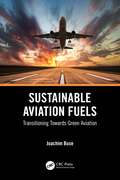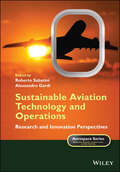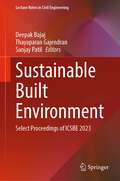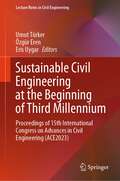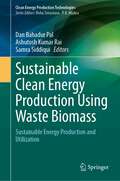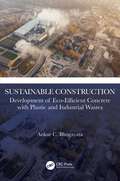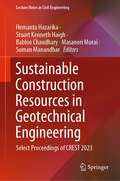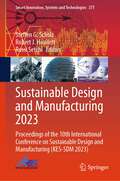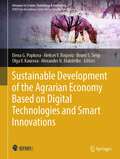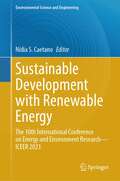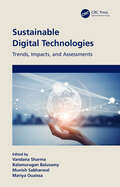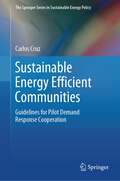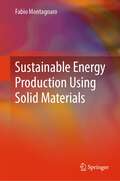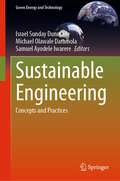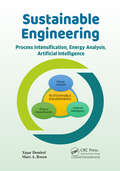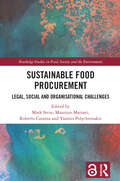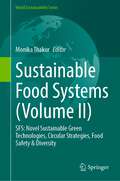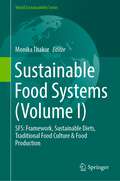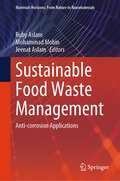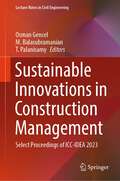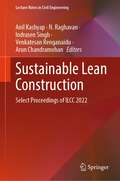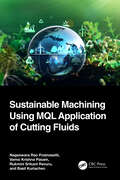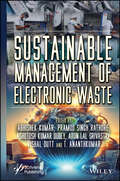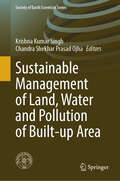- Table View
- List View
Sustainable Aviation Fuels: Transitioning Towards Green Aviation
by Joachim BuseSustainable Aviation Fuels discusses the transfer process of aviation to carbon-neutral flights, including how to manage the transition period. It also demonstrates how to develop and design a new approach for environmentally friendly air transport with reduced emissions. Covering the full scope of commercialisation, market considerations, advisements on investments and transition challenges of sustainable aviation fuels (SAF), the book tackles questions related to the cost of changing fuel types, competitive market models that can exist parallel to the oil industry and strategies for airlines to implement. It considers reliability requirements for feedstock suppliers and SAF producers, as well as ways to avoid feedstock shortages. The book will interest aviation industry professionals, fuel producers, airline fuel buyers, airport operators and propulsion engineers working on SAF production. Aviation, aerospace and business students taking courses in propulsion, gas turbine emissions, air transport management, supply chain development and sustainable energy production will find the book useful as well.
Sustainable Aviation Technology and Operations: Research and Innovation Perspectives (Aerospace Series)
by Roberto Sabatini Alessandro GardiSustainable Aviation Technology and Operations Comprehensively covers research and development initiatives to enhance the environmental sustainability of the??aviation sector Sustainable Aviation Technology and Operations provides a comprehensive and timely outlook of recent research advances in aeronautics and air transport, with emphasis on both long-term sustainable development goals and current achievements. This book discusses some of the most promising advances in aircraft technologies, air traffic management and systems engineering methodologies for sustainable aviation. The topics covered include: propulsion, aerodynamics, avionics, structures, materials, airspace management, biofuels and sustainable lifecycle management. The physical processes associated with various aircraft emissions — including air pollutants, noise and contrails — are presented to support the development of computational models for aircraft design, flight path optimization and environmental impact assessment. Relevant advances in systems engineering and lifecycle management processes are also covered, bridging some of the existing gaps between academic research and industry best practices. A collection of research case studies complements the book, highlighting opportunities for a timely uptake of the most promising technologies, towards a more efficient and environmentally sustainable aviation future. Key features: Contains important research and industry relevant contributions from world-class experts. Addresses recent advances in aviation sustainability including multidisciplinary design approaches and multi-objective operational optimisation methods. Includes a number of research case studies, addressing propulsion, aerostructures, alternative aviation fuels, avionics, air traffic management, and sustainable lifecycle management solutions. Sustainable Aviation Technology and Operations is an excellent book for aerospace engineers, aviation scientists, researchers and graduate students involved in the field.
Sustainable Built Environment: Select Proceedings of ICSBE 2023 (Lecture Notes in Civil Engineering #451)
by Deepak Bajaj Thayaparan Gajendran Sanjay PatilThis book presents the select proceedings of International Conference on Sustainable Built Environment (ICSBE 2023). It discusses the issues of sustainability and resilience in all types of building projects, construction projects, operational building, and infrastructure projects within urban regions of the world. The key themes covered in this book are sustainable urban planning, sustainable construction, real estate, housing, net-zero built environment, climate change policy, legal framework, climate finance, technology, and innovation toward decarbonization of the built environment. This book is useful for researchers and professionals working in the fields of construction management, built environment, and allied fields.
Sustainable Civil Engineering at the Beginning of Third Millennium: Proceedings of 15th International Congress on Advances in Civil Engineering (ACE2023) (Lecture Notes in Civil Engineering #481)
by Umut Türker Özgür Eren Eris UygarThis volume comprises selected peer-reviewed proceedings of 15th International Congress on Advances in Civil Engineering (ACE 2023) was held in Famagusta, North Cyprus in September 2023. This proceedings covers all disciplines of Civil Engineering classified under six main topics: Construction Management, Hydraulics, Geotechnics, Materials, Structures, Transportation, and Civil Engineering Education. It covers highly diverse research topics including investigation in the areas of innovative materials in concrete production, recycling of waste in the construction industry, fibre reinforced and high strength concrete, soil stabilization, problematic soils of semi-arid and arid regions, deep foundations, staged construction modelling, repair and maintenance of reinforced concrete, earthquake engineering and seismic retrofitting, coastal and harbour engineering, water resources management, hydrology & hydraulics engineering, traffic engineering and urban transport, life cycle cost analysis, decision making strategies.
Sustainable Clean Energy Production Using Waste Biomass: Sustainable Energy Production and Utilization (Clean Energy Production Technologies)
by Dan Bahadur Pal Ashutosh Kumar Rai Samra SiddiquiThis edited volume covers sustainable biomass valorization and its application in various sectors.Bioenergy has concerned enormous attention as a promising alternative to conventional energy resources. Abundance of bioresources and their renewable nature provides a distinct advantage to biofuels from sustainability perspective. Biofuels have found increasing applications in the energy and transportation sector in recent years. Blended fuels are being used worldwide. However, several challenges remain to be addressed due to the diverse nature of biomasses and inherent recalcitrant nature of biological materials used as feedstock. This book aims to provide an overview of recent developments in the production of bioenergy and its applications in various areas. Specific emphasis is given to production of biofuels from modern biomass such as agro-forest waste and dedicated non-edible energy crops that do not interfere with food production. The scope of the book covers synthesis and characterization of biologically derived fuels, advances in microbiological methods and enzyme engineering approaches. The book covers techno-economic analysis to identify challenges and prospects for commercialization of biofuels. The directions for future research should pave way for net zero scenario for a sustainable world.The book will cater to a wide range of readers interested in learning the fundamentals as well as advances in the field of biofuels.
Sustainable Construction: Development of Eco-Efficient Concrete with Plastic and Industrial Wastes
by Ankur C. BhogayataThis book focuses on the utilization of wastes produced from plastic usage by industry and consumers, along with the partial to full replacement of conventional cement as a primary binder material in concrete. This book demonstrates how to use post-consumer waste plastics and industry wastes from thermal power stations, agro-industries, and metal industries with a scientific approach to conventional concrete. The primary aim is to demonstrate the methods to prepare a sustainable alternative construction material of concrete using waste materials. Features: Illustrates making eco-friendly procedures of concrete construction popular by way of utilization of plastics and industrial wastes Covers all major aspects of plastic waste-based concrete from conception to execution Promotes alternative materials for sustainable construction Describes economic aspects of using eco-efficient concrete on a mass scale Includes experimental results with graphs This book is aimed at researchers and graduate students in civil engineering, construction materials, and concrete.
Sustainable Construction Resources in Geotechnical Engineering: Select Proceedings of CREST 2023 (Lecture Notes in Civil Engineering #448)
by Hemanta Hazarika Stuart Kenneth Haigh Babloo Chaudhary Masanori Murai Suman ManandharThis book presents select proceedings of the 2nd International Conference on Construction Resources for Environmentally Sustainable Technologies (CREST 2023), and focuses on sustainability, promotion of new ideas and innovations in design, construction and maintenance of geotechnical structures with the aim of contributing towards climate change adaptation and disaster resiliency to meet the UN Sustainable Development Goals (SDGs). It presents latest research, information, technological advancement, practical challenges encountered, and solutions adopted in the field of geotechnical engineering for sustainable infrastructure towards climate change adaptation. This volume will be of interest to those in academia and industry alike.
Sustainable Design and Manufacturing 2023: Proceedings of the 10th International Conference on Sustainable Design and Manufacturing (KES-SDM 2023) (Smart Innovation, Systems and Technologies #377)
by Steffen G. Scholz Robert J. Howlett Rossi SetchiThe book consists of peer-reviewed papers presented at the International Conference on Sustainable Design and Manufacturing (SDM 2023). Leading-edge research into sustainable design and manufacturing aims to enable the manufacturing industry to grow by adopting more advanced technologies and at the same time improve its sustainability by reducing its environmental impact. Relevant themes and topics include sustainable design, innovation and services; sustainable manufacturing processes and technology; sustainable manufacturing systems and enterprises; decision support for sustainability; and Industry 4.0 and Intelligent Manufacturing. Application areas are wide and varied. The book provides an excellent overview of the latest developments in the sustainable design and manufacturing area.
Sustainable Development of the Agrarian Economy Based on Digital Technologies and Smart Innovations (Advances in Science, Technology & Innovation)
by Elena G. Popkova Aleksei V. Bogoviz Bruno S. Sergi Olga V. Kaurova Alexander N. MaloletkoThis book elaborates on the modern experience and prospects and the development of recommendations for sustainable development of the agrarian economy based on digital technologies and smart innovations for the provision of food security. This book dwells on the global and regional challenges for food security and answers to them through the sustainable development of the agrarian economy. The book also studies the international experience of sustainable development of the agrarian economy on the basis of digital technologies and advantages for food security. Sustainable development of the agrarian economy with the use of digital technologies—as the foundation of food security of Central Asia—is considered. The prospects for provision of food security through the use of smart innovations for the sustainable development of the agrarian economy are outlined. A set of applied recommendations for raising the effectiveness of the use of smart innovations for the sustainable development of the agrarian economy is proposed.
Sustainable Development with Renewable Energy: The 10th International Conference on Energy and Environment Research—ICEER 2023 (Environmental Science and Engineering)
by Nídia S. CaetanoThis proceedings book contains the full papers of the 10th edition of the International Conference on Energy and Environment Research, ICEER 2023, that took place in Madrid, Spain during October 7–9, 2023. ICEER 2023 is a joint organization of the School of Engineering (ISEP) of the Polytechnic of Porto (P.Porto) and the SCIEI, with collaboration of the Dipartimento di Ingegneria of the Università degli studi "Roma Tre", CIETI and LEPABE research groups. This book includes all the well prepared full papers presented at ICEER 2023.
Sustainable Digital Technologies: Trends, Impacts, and Assessments
by Vandana Sharma, Balamurugan Balusamy, Munish Sabharwal, and Mariya OuaissaThis book is a reference on digital technology and its impact on sustainability, providing insight into sustainable practices globally. It focuses on the critical practices leading to sustainable initiatives among various organizations, IT infrastructure, communities, and government compliance. The book describes the green computing paradigms and the impact of a circular economy with a focus on sustainable practices in a post-pandemic world. Sustainable Digital Technologies: Trends, Impacts, and Assessments discusses the critical factors leading to sustainable initiatives in a global economy. It highlights the impact of digital technology and Industry 4.0 in today’s world. The book focuses on the role, responsibility, and the effect of the Internet of Things for digital sustainability and practices. It describes implementation strategies for green cloud computing and presents additional strategies for sustainable practices in a post-pandemic world. This publication is designed for use by technology development academicians, data scientists, industrial professionals, researchers, and students interested in uncovering the latest innovations in the field and the current research on problem-oriented processing techniques in sustainable and evolutionary computing applications with reduced energy channelization.
Sustainable Energy Efficient Communities: Guidelines for Pilot Demand Response Cooperation (The Springer Series in Sustainable Energy Policy)
by Carlos CruzThis book analyses issues surrounding the efficient integration of demand response programmes in residential communities. It also explores the benefits and energy efficiency co-ordination corresponding to demand response service in a cooperative system. The author explains how sensors, communication technologies, computational ability, and control can be effectively combined to create a demand planification system. Smart appliances (SAs) and other connected devices, together with smart communities (SCs)—which enable energy consumers to pursue common goals through cooperation and coordinated behaviour within the framework of the Internet of things (IoT)—have raised expectations regarding deployment of the information and communication technologies (ICTs) to encourage uptake of demand response (DR) energy efficiency programmes. DR programmes pursue a reduced carbon footprint, balanced supply and demand, and behavioural change in consumers. The book provides sustainable evidence of ICT-supported energy management that can help consumers flexibly manage demand through the formation of sustainable SCs that maximise renewable energy use through large-scale cooperative management mechanisms. SCs cooperating securely in identifying consumption patterns can foster sustainable and efficient energy use, with the outcome of benefits for the participants and for the environment.
Sustainable Energy Production Using Solid Materials
by Fabio MontagnaroThis textbook focuses on sustainable energy production using solid materials. With explanatory tables and figures, case studies, worked-out examples, and up-to-date bibliographies of other works, the book provides an in-depth exploration of the most innovative aspects of the field.Readers of the book will gain critical skills in characterizing and reacting to biomass, including the formation of pollutants, as well as using fluidized bed reactors for heterogeneous processes. The book also explores innovative methods for mitigating the greenhouse effect, reusing ashes as adsorbents or in cement production, and thermochemical solar energy storage. This book will give students, novice researchers, and industry professionals valuable insights and knowledge into the sustainable production of energy using solid materials.
Sustainable Engineering: Concepts and Practices (Green Energy and Technology)
by Israel Sunday Dunmade Michael Olawale Daramola Samuel Ayodele IwarereSustainable Engineering: Concepts and Practices provides insights into current perspectives on sustainable engineering research. It highlights the drivers, motivations, and challenges affecting the development and adoption of sustainable engineering in various sectors of the economy and how they impact sustainable development. Contributions from researchers representing multiple branches of engineering in academia, government laboratories, and industry present alternative approaches to traditional engineering practices. These approaches effect change, making the design, construction, production, and management of products, processes, and systems more environmentally friendly, socially beneficial, and economically profitable. The book will be a trusted reference for graduate students, practicing engineers, and other professionals interested in developing or using sustainable products and systems.
Sustainable Engineering: Process Intensification, Energy Analysis, and Artificial Intelligence
by Yasar Demirel Marc A. RosenSustainable engineering is of great importance for resilient and agile technology and society. This book balances economics, environment, and societal elements of sustainable engineering by integrating process intensification, energy analysis, and artificial intelligence to reduce production costs, improve the use of material and energy, product quality, safety, societal well-being, and water usage. The book provides comprehensive discussion of topics on process intensification, energy analysis, and artificial intelligence that include optimization, energy integration, green engineering, pinch analysis, exergy analysis, feasibility analysis, life cycle assessment, circular economy, bioeconomy, data processing, machine learning, expert systems, digital twins, and self-optimized plants for sustainable engineering.
Sustainable Food Procurement: Legal, Social and Organisational Challenges (Routledge Studies in Food, Society and the Environment)
by Mark Stein Maurizio Mariani Roberto Caranta Yiannis PolychronakisThe book examines sustainable food procurement policy and practice in the European Union and beyond, exploring the extent to which sustainability objectives have been achieved and evaluating the new developments taking place at both EU and national levels.While there is a growing recognition that public authorities can use public procurement as a policy tool to pursue multiple environmental, health and socio-economic objectives, contracting authorities still face many challenges. This volume investigates the scope for pursuing sustainable objectives in public procurement of food and catering services, examining different regulatory contexts and organisational models to answer the overall question of how to integrate sustainability concerns into the various phases of public food procurement processes. Contributions in the book examine the policy and legal procurement framework and practices for sustainable public catering in three EU Member States: Italy, France and Spain. There is a comparative survey of the Baltic Region, including Denmark, Estonia, Finland, Poland and Russia, and moving beyond the EU, there is examination of the UK and Brazil, as well as a cross country comparison of the UK with Denmark and Sweden. Drawing on the expertise of an interdisciplinary and intersectoral team of contributors allows the book to benefit from the insights of different disciplines, including business sciences, anthropology and law. Tapping into the global discussion on public food procurement as a means to achieve multiple social and environmental goals, this work will stimulate readers looking for new creative ways to create value through public food purchasing.This book will be of great interest to students, researchers, policymakers and public- and private-sector representatives interested in public procurement, food policy and law, sustainable food sourcing and supply chain management.
Sustainable Food Systems: SFS: Novel Sustainable Green Technologies, Circular Strategies, Food Safety & Diversity (World Sustainability Series)
by Monika ThakurSustainable Food System has cutting-edge green & circular Technologies, food Safety & diversity that aims to provide quality and safe foods in an environmentally conscious and sustainable way. The book addresses both the theoretical and applied aspects of sustainable food diverse food systems. This concept of Sustainable Food System under SDG Goals is such a vast concept that, it has been impossible to highlight all the concepts in one volume. Therefore, the Editor have compiled this voluminous, comprehensive and compendious approach as balanced and organized structure of work as: Sustainable Food System Volume I & II.A Sustainable Food System (SFS) is a comprehensive food system and Volume II targets the Novel Sustainable Green Food Processing Technologies, Circular Strategies for Recovery & Valorization and the overall sustainable techniques for Food Safety & Food Diversity. The book has a very comprehensive outline, divided in 3 major sections and further 20 different chapters. All chapters in different sections will be written by key scientists with diverse backgrounds in either industry / R&D / academia, and will provide an update on emerging ideas and sustainable technologies as well as vision for the future. The Section 5: Novel Sustainable Green Food Processing Technologies primarily focusing on the novel green different food processing technologies in different food categories. The Section 6: Circular Strategies for Recovery & Valorization, deals with different circular strategies for valorization of the food products. The Section 7: Sustainable Techniques for Food Safety & Food Diversity, will cover the food safety trends and food diversities nationally & internationally.
Sustainable Food Systems: SFS: Framework, Sustainable Diets, Traditional Food Culture & Food Production (World Sustainability Series)
by Monika ThakurSustainable Food System is a food system that delivers food safety & security as two key elements and nutrition for masses having impact on their social, economic, and environmental bases to generate nutritional food security for future generations shall not be compromised. Therefore, SFS targets the economic sustainability, social sustainability and environmental sustainability and makes a robust system having expansive benefits for the society. This concept of Sustainable Food System under SDG Goals is such a vast concept that, it has been impossible to highlight all the concepts in one volume. Therefore, the Editor have compiled this voluminous, comprehensive and compendious approach as balanced and organized structure of work as: Sustainable Food System Volume I & II.The Sustainable Food System (Volume - I): framework, sustainable diets, Traditional Food Culture & Food production has a very comprehensive outline and divided in 4 major sections and further 24 different chapters. The book addresses both the theoretical and applied aspects of sustainable food diverse food systems A Sustainable Food System (SFS) is a comprehensive food system that targets the sustainable diets, traditional food culture with indigenous system and the overall food production on as well. All chapters in different sections will be written by key scientists with diverse backgrounds in either industry / R&D / academia, and will provide an update on emerging ideas and sustainable technologies as well as vision for the future. The 1st section: Sustainable Food System: concepts & framework primarily focusing on the Sustainable food systems, its conceptual introduction, framework and different concepts nationally & internationally. The 2nd section: Responsible consumption and sustainable diets deals with different aspects of nutrients sustaining health & sustainable diets. The 3rd section: Conservation and promotion of Traditional Food Culture, covers the conservation & promotion of traditional food cultures & their practices. The last & 4th section: Climate change and sustainable food production provide the current knowledge and innovative developments related to climate change, nutritional security & agronomic bio-fortification.
Sustainable Food Waste Management: Anti-corrosion Applications (Materials Horizons: From Nature to Nanomaterials)
by Ruby Aslam Mohammad Mobin Jeenat AslamThis book highlights established research and technology on corrosion inhibitors and bio-waste management. It further discusses emerging aspects of utilizing food waste in the field of corrosion inhibition. The topics covered include overview on bio-waste and their management, different types of food waste (i.e., agricultural, vegetable and fruit/fruit juice, plant waste, slaughterhouse trash), and their application as corrosion inhibitors and mitigation of corrosion. It also discusses economic aspects and commercialization of food waste as corrosion inhibitors. The book is a valuable reference for beginners, researchers, and professionals working in the areas of sustainability, food waste management, and material science.
Sustainable Innovations in Construction Management: Select Proceedings of ICC-IDEA 2023 (Lecture Notes in Civil Engineering #388)
by Osman Gencel M. Balasubramanian T. PalanisamyThis book presents the select proceedings of International Conference on Civil Engineering: Innovative Development in Engineering Advances (ICC IDEA 2023). This book covers the latest research in the areas of construction engineering and management, urban planning and design, building energy conservation and green architecture, materials science and engineering, innovation in construction materials, and information technology in civil engineering. The book is useful for researchers and professionals in civil engineering.
Sustainable Lean Construction: Select Proceedings of ILCC 2022 (Lecture Notes in Civil Engineering #383)
by Anil Kashyap N. Raghavan Indrasen Singh Venkatesan Renganaidu Arun ChandramohanThis book presents select proceedings of the Indian Lean Construction Conference (ILCC 2022) with adoption and implementation cases of lean concepts across Indian construction projects. The topics covered are lean culture and behavior, lean in sustainable and green technologies, lean supply chain management and offsite construction, lean in public sector, lean in modern construction techniques, etc. The book also discusses various properties and performance attributes of lean tools and techniques across various construction practices in infrastructure and real estate projects. The book is a valuable reference for researchers and construction professionals interested in Lean Construction.
Sustainable Machining and Green Manufacturing
by S. Thirumalai Kumaran Tae Jo KoThis book aims to be a source for understanding sustainable machining and green manufacturing. The goal is to gain new ideas and encourage readers to utilize fewer natural resources to reduce pollution. Some examples include cutting material needs, recycling and reusing materials, and promoting environmentally-friendly practices such as dry machining and eco-friendly cutting fluids. By reducing pollution and waste, more environmentally-friendly practices will help encourage a more environmentally conscious future. Ideas evaluated in this book The investigating of synergy between natural fibers and epoxy composites that enhance mechanical properties Explores the potential of sustainable reinforcements in polymer composites Uncovers the critical role of manufacturing methods in determining the mechanical prowess of biofiber-reinforced composites Details the importance of environmentally friendly conscious manufacturing processes Discusses topics on precision machining, additive manufacturing, and optimizing manufacturing processes
Sustainable Machining Using MQL Application of Cutting Fluids
by Nageswara Rao Posinasetti Vamsi Krishna Pasam Rukmini Srikant Revuru Basil KuriachenThe application of metal cutting fluids is an integral part of industrial machining operations. Minimum quantity lubrication (MQL) is the latest form of cutting fluid application method currently used by several manufacturing organizations. This book consolidates all the available knowledge in terms of the application of different processes as well as materials in a concise fashion in one reference resource. Sustainable Machining Using MQL Application of Cutting Fluids offers a detailed discussion of the MQL mechanism in cutting fluid applications. It highlights the influence of MQL parameters on different workpiece materials and provides sound explanations along with photographs for all technical reasonings. The book presents the usage of both micro and nano cutting fluids in machining for sustainability while it also captures the knowledge in the field including the recent research outputs, as it illustrates a comprehensive coverage of MQL practical application. This book should be on the bookshelf of industrial engineers, those working in production and manufacturing, process designers, tool material designers, cutting tool designers, and quality specialists. Researchers, senior undergraduate students, and graduate students will also find this book full of very helpful reference information.
Sustainable Management of Electronic Waste
by Abhishek Kumar Pramod Singh Rathore Ashutosh Kumar Dubey Arun Lal Srivastav T. Ananth Kumar Vishal DuttSUSTAINABLE MANAGEMENT OF ELECTRONIC WASTE Written and edited by a group of industry professionals, this new volume provides cutting-edge insights into how the sustainability of managing electronic waste can be achieved, for engineers, scientists, and students. As a result of the rapid advancement of technology and the globalization of the economy, waste electrical and electronic equipment (WEEE) management has become increasingly important. Manufacturers are especially concerned about the proper disposal of their waste, and researchers need to identify the obstacles and enablers that stand in the way of implementing a long-term WEEE management system in order to develop a long-term WEEE management system. Further, the literature did not adequately capture the perspectives of multiple stakeholders while also identifying the enablers required for the development of sustainable WEEE management policies, which was particularly important in developing countries. This volume fills a gap in the literature by considering the perspectives of multiple stakeholders to identify enablers of sustainable WEEE management in emerging economies which was previously unexplored. This book focuses on the most recent technological advancements for the twenty-first century, emphasizing the synergies that exist between computer science, bioinformatics, and other sciences. The research and development of artificial intelligence, machine learning, blockchain technologies, quantum computing with cryptography, nanotechnology, sensors based on biotechnology, Internet of Things devices, nature-inspired algorithms, computer vision techniques, computational biology, and other topics are covered in this book, along with their applications in the fields of science, engineering, physical science, and economics. Modern environmental techniques are among the most innovative innovations emerging as a result of the insatiable demand for health standards in the modern world.
Sustainable Management of Land, Water and Pollution of Built-up Area (Society of Earth Scientists Series)
by Chandra Shekhar Prasad Ojha Krishna Kumar SinghThis edited book is a comprehensive and forward-thinking exploration of the challenges and opportunities in building environmentally resilient and thriving cities. In a rapidly urbanizing world, the management of land, water, and pollution within built-up areas is a critical issue, and this book presents a wealth of knowledge to address it. It showcases a range of case studies and real-world applications that illustrate successful strategies and innovative solutions for urban sustainability. These practical examples offer valuable insights for urban planners, policymakers, and environmental practitioners.The book delves into cutting-edge research and visionary solutions. It goes beyond conventional approaches to explore emerging technologies and futuristic concepts, positioning itself at the forefront of urban sustainability. Readers will discover innovative ideas that can shape the future of urban development, making cities more livable, sustainable, and resilient.
